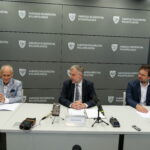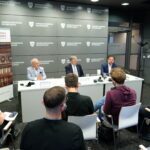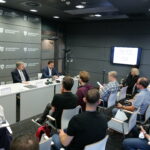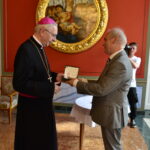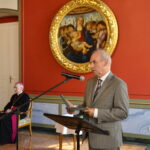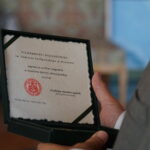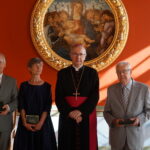news
We invite you to watch a short footage from the Poznan Philharmonic Orchestra’s trip to Świdnica. On the 11th of September in the Church of Peace, on the 20th anniversary of the World Trade Center attack, the musicians led by Łukasz Borowicz performed the works by Mozart as well as a composition ordered for that occasion from Ewa Fabiańska-Jelińska. Rafał Blechacz was the soloist of the evening.
A composer, pianist, musicologist and music activist. It was him that Stanisław Wisłocki, who in 1947 created a symphonic orchestra in Poznan, proposed as the director of the emerging philharmonic. Tadeusz Szeligowski, the first director of the Poznan Philharmonic (1947-1949), has become its patron.
Born in Lviv, he completed law studies at the Jagiellonian University. It was music, however, that has become the most important in his life. He took up musicologist studies, and when in 1929 he went to Paris for his composing scholarship, he decisively resigned from the legal profession. Two years later he started his work at the Poznan Conservatory.
Today, on the 13th of September 2021, falls the 125th birthday anniversary of Tadeusz Szeligowski. On behalf of the artists and employees of the Poznan Philharmonic Wojciech Nentwig – the Managing Director of the Philharmonic, Łukasz Borowicz – the Music Director of the Philharmonic and Chief Conductor of the Poznan Philharmonic Orchestra and Elżbieta Kralkowska-Mielcarek – Deputy Director of the Philharmonic, laid a bunch of flowers in the Crypt of Distinguished Wielkopolska Citizens on the St Wojciech Hill.
We would like to inform you that after the summer break the ticket office of the Poznan Philharmonic (situated in the lobby of AMU Concert Hall, Wieniawskiego Street 1) will reopen from the 6th of September 2021. In the 2021/2022 artistic season it will stand open from Monday to Friday between 1 pm and 5 pm, and on the days of concerts organized by the Poznan Philharmonic – from 1 pm till the beginning of the concert.
The booked DL and SG season tickets can be purchased between the 6th and the 30th of September.
The booked KP season tickets can be purchased between the 20th and the 30th of September.
The booked MW season tickets can be purchased after the sale of the DL, SG and KP season tickets is completed, that is past the 30th of September. The number of MW season tickets is limited and the sale will be conditioned by the government’s epidemic guidelines regarding the maximum admissible number of people in the concert halls.
We would like to inform our faithful auditors that during the purchase of the new season tickets, the electronic season tickets from the previous season are necessary.
The reservations for the individual tickets are taken from the 6th of September either by e-mail: rezerwacje@filharmoniapoznanska.pl or by phone: 618-536-935 or 618-522-266. We are also at your disposal in the ticket office, though as to reservations and additional questions we recommend remote contact.
The sales of individual tickets and the on-line sales begins on the 28th of September.
Due to the state of the epidemic and the government’s guidelines related to it we reserve the right to modify the timetable of the sales of season tickets and individual tickets presented above.
We would like to inform you that after the summer break the ticket office of the Poznan Philharmonic (situated in the lobby of AMU Concert Hall, Wieniawskiego Street 1) will reopen from the 6th of September 2021. In the 2021/2022 artistic season it will stand open from Monday to Friday between 1 pm and 5 pm, and on the days of concerts organized by the Poznan Philharmonic – from 1 pm till the beginning of the concert.
The booked DL and SG season tickets can be purchased between the 6th and the 30th of September.
The booked KP season tickets can be purchased between the 20th and the 30th of September.
The booked MW season tickets can be purchased after the sale of the DL, SG and KP season tickets is completed, that is past the 30th of September. The number of MW season tickets is limited and the sale will be conditioned by the government’s epidemic guidelines regarding the maximum admissible number of people in the concert halls.
We would like to inform our faithful auditors that during the purchase of the new season tickets, the electronic season tickets from the previous season are necessary.
The reservations for the individual tickets are taken from the 6th of September either by e-mail: rezerwacje@filharmoniapoznanska.pl or by phone: 618-536-935 or 618-522-266. We are also at your disposal in the ticket office, though as to reservations and additional questions we recommend remote contact.
The sales of individual tickets and the on-line sales begins on the 28th of September.
Due to the state of the epidemic and the government’s guidelines related to it we reserve the right to modify the timetable of the sales of season tickets and individual tickets presented above.
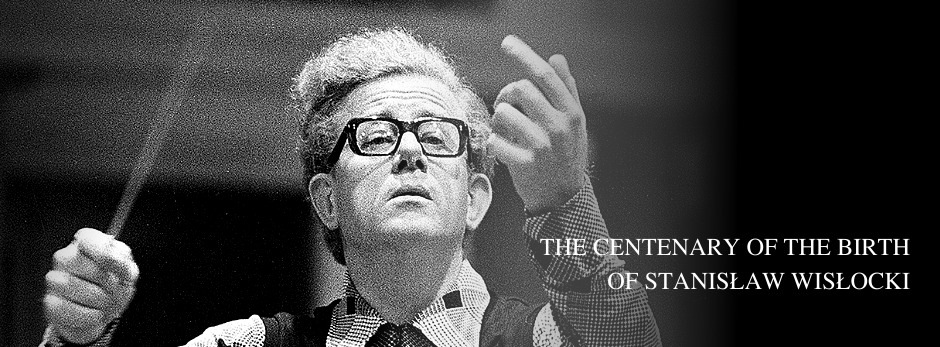
He was born a hundred years ago – on the 7th of July 1921 in Rzeszów. A magnificent conductor, composer, pianist and pedagogue. He went down in the history of Poznan in a special way when in 1947 he formed Poznan Philharmonic Orchestra and held the position of its first conductor and artistic director of the Philharmonic until 1958.
That’s what he wrote about his work in Poznan in the book “Life of one musician”:
“In the first work period with the orchestra I placed the greatest emphasis on the classical repertoire, as it’s the best one to even out the sound. (…) Then we worked on the music of romanticism, neo-romanticism and the 20th century, including Polish contemporary music. After the orchestra have reached a significant level of technical advancement, we increased the number of Polish premieres. The Polish Composers’ Union often trusted us with organizing the auditions of new works. Thus close to the Philharmonic’s fifth anniversary we could talk about achievements on a national scale.”
Wisłocki was memorialized in Poznan, along with his wife Izabella, on of the tenement houses of the North frontage of the Old Market Square. On the frieze under the second floor’s windows of number 88 Julian Boss-Gosławski placed the images of the architect Izabella Wisłocka, who designed the reconstruction of the majority of tenements at this part of the Square, and her husband Stanisław Wisłocki, who back then was the artistic director of Poznan Philharmonic.
Poznan Philharmonic Orchestra will play the concert dedicated to the memory of Stanisław Wisłocki under the baton of Antoni Wit on the 13th of November this year. The program includes Piano Concerto by Stanisław Wisłocki in the interpretation of Krzysztof Książek.
Exceptional place, exceptional music and exceptional atmosphere… It must be Kloster Chorin in Brandenburg and the annual summer music festival, Choriner Musiksommer. Poznan Philharmonic Orchestra are regular guests there.
The festival is held in the walls of the picturesque post-cysterian abbey, partially ruined. The unusual scenery and the acoustics of this place is well-known to visitors of the local artistic events. Today we present a few photos from our concert which took place on Saturday, the 3rd of July. It is a souvenir for those, who spent last Saturday in Chorin, and a short impression for those, who couldn’t be there…
In Chorin Poznan Philharmonic Orchestra and Tomasz Daroch (cello), led by Łukasz Borowicz, performed the Overture to the Opera “Castle of Czorsztyn” by Karol Kurpiński, Cello Concerto in C major, Hob. VIIb/1 by Joseph Haydn and Symphony No. 1 in G minor by Étienne Nicolas Méhul.
Due to pandemic restrictions the concert was held twice. Both performances were greatly applauded by the audience which led to encores.
Below we publish the review of the concert by Poznan Philharmonic Orchestra which came out in Märkische Oderzeitung.
Poznan Philharmonic Orchestra charms at the Festival of Classical Music in the cloister
Kurpiński, Haydn or Méhul – Poznan Philharmonic Orchestra attracts the audience of Choriner Musiksommer with belligerent sounds and a greatly joyful play.
An overture, as befits, opens a conventional concert program or a dramatic and musical work. The Overture to the Opera “Castle of Czorsztyn” by Karol Kurpiński from 1819 stands for both variants. On Saturday Poznan Philharmonic Orchestra began with it the guest performance at the 58th Choriner Musiksommer.
The Polish composer’s work musically fluctuates between the classical and the romantic era. It is an exhilarating summary of a rather banal plot with a dose of horror, fainting and the joy of reunion. After a dramatic opening cheerful expectation and tones filled with buoyant elegance appear, followed by imminent resentment and a multitude of aggregated conflicts. Poznan Philharmonic Orchestra conducted by Łukasz Borowicz presented this range of emotions with an entrancing engagement.
Cello Concerto No. 1 in C major by Joseph Haydn with Tomasz Daroch at the solo part, the playful virtuosity of which captures from the first movement (Moderato), vibrates with playful lightness. Adagio spreads a truly musical mood and comfort which resembles casual singing on the strings. The bright tone of the superbly prepared “accompanying ensemble” also supports the Allegro finale in the roaring and dynamic performance. The pure joy presented by the musicians in their play was appropriately applauded.
With equal commitment they interpreted the fascinating music of the Symphony No. 1 in G minor by Étienne Nicolas Méhul, an important composer from the period of French Revolution. Ludwig van Beethoven was very stirred by his concentrated energy, it was even reflected in his opera “Fidelio”. The Frenchman’s G minor also echoes Haydn and Mozart. The initial part is sinister, full of conflicts and gripping. While the rich variations of the succeeding Andante have contemplative character, the humorous Allegro moderato pizzicato provides delightful diversity. Poznan musicians effectively trail the refinement of the orchestral sound until the energetic finale.
The fact that the listeners and musicians can now have direct aural and visual contact and the invisible currents of energy between them flow once again is one of the hopeful impressions from the concert afternoon in the Chorin cloister, which was also pleasant thanks to the weather conditions.
Peter Buske
Märkische Oderzeitung
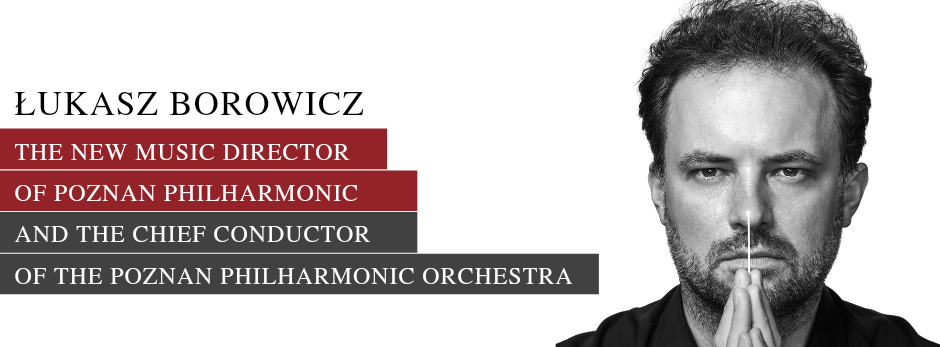
Marek Woźniak, the Marshal of the Wielkopolska Region, presented the new chief musical director on the Friday press conference.
– ‘We have got together to officially announce magnificent news concerning the new season of the Poznan Philharmonic. Along with its beginning the position of the music director – chief conductor of the Poznan Philharmonic Orchestra will be taken up by Łukasz Borowicz, who has been cooperating with our Philharmonic for many years through great concerts and recordings’, said Marek Woźniak. ‘We are extremely happy that among many other interesting proposals Łukasz Borowicz has chosen Poznan. For us it means high quality of the artistic offer.’
– ‘When years ago I talked with Kazimierz Kord, one of the greatest Polish conductors, he told me that you could count on one hand the number of conductors who have “sound in their hands”. Łukasz Borowicz was one of them’, recalled Wojciech Nentwig, the Director of the Poznan Philharmonic. ‘I took his advice and we outreached Łukasz Borowicz’.
Wojciech Nentwig also presented the outline of the new 75th artistic season of the Poznan Philharmonic. A galaxy of prominent soloists and conductors will appear not only on the stage of the AMU Concert Hall, the auditorium of Poznan Philharmonic, but also out of Poznan, along with the Poznan Philharmonic Orchestra. On the 11th of September, the 20th anniversary of the attack on the World Trace Center, for instance, in the Church of Peace in Świdnica Rafał Blechacz will perform, accompanied by Poznan Philharmonic Orchestra – it is his only concert with an orchestra scheduled in Poland this year.
During the conference Łukasz Borowicz shared his vision of conducting and working with an orchestra. He also highlighted the role of Poznan as a philharmonic center on the musical map of Poland and Europe.
– ‘Poznan Philharmonic is a globally recognized brand. We know from artists and their agents that those who come here, wish to return – because of the orchestra, the audience, the atmosphere accompanying their performances’, said Łukasz Borowicz. ‘The tough pandemic times we have survived strengthened us by dealing with numerous artistic challenges and overcoming barriers we had no idea of. For me the most important thing is that in the Poznan Philharmonic I can make my dreams come true: I have been doing it, along with the orchestra, uninterruptedly since 2006, since the memorable concert with Ida Haendel.’
The day before the celebrations of the feast of the Saint Apostles Peter and Paul, patrons of the Poznan cathedral, in the archepiscopal residence a prize-giving ceremony of the Archbishop of Poznan’s Award was held to honour remarkable achievements in the field of Christian culture. Poznan Philharmonic was among this year’s laureates.
On the invitation of the Poznan Philharmonic, the ceremony was graced by the performance of Andrzej Wierciński, a young pianist preparing for this year’s edition of the Chopin competition in Warsaw who played Ballade in F minor, Op. 52 by Frédéric Chopin.
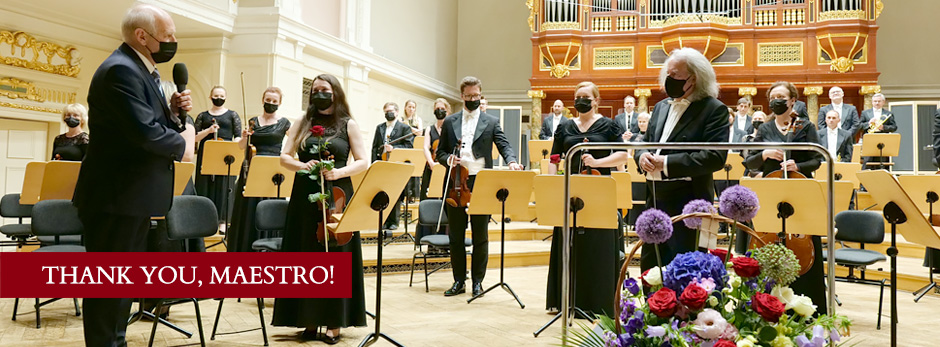
Fourteen years have passed like one day…. Has that thought run through the head of Maestro Marek Pijarowski when on Friday evening, on the 18th of June, he raised the baton for the last time at the end of the magnificent Italian Symphony by Felix Mendelssohn? The concert he led that day, closing the 2020/2021 artistic season of the Poznan Philharmonic, was also his jubilee concert which crowned the 50th anniversary of artistic work and the 70th birthday anniversary of the Maestro (hence the concert’s title: “Maestro”). It was also the last time he appeared on the stage of the AMU Concert Hall as the Chief Conductor of the Poznan Philharmonic Orchestra. Thus there were many emotional moments and occasions for acknowledgments.
Marek Woźniak, Marshal of the Wielkopolska Region, Wojciech Nentwig, Director of the Poznan Philharmonic and Radosław Komolka, Inspector of the Poznan Philharmonic Orchestra thanked Maestro for his excellent work in the past seasons (Marek Pijarowski was the Chief Conductor from 2007/2008 artistic season to 2020/2021). The Marshal and the Director also expressed words of gratitude to the conductor for lending a helping hand to the Philharmonic and the orchestra years ago, when they were going through a tough time.
Meanwhile Maestro spared no warm words towards the orchestra and thanked it for the most wonderful years he had spent with it. He also recalled the beginnings, when Wojciech Nentwig, freshly minted Director of the Poznan Philharmonic, called him with an appointment proposal. They met in Wroclaw.
‘I listened to him envisioning the development of the Philharmonic and I thought: what a lunatic!’, said Marek Pijarowski from the stage. ‘I kept listening and… I got more and more involved, so I thought: maybe two lunatics? And so it began…’
There were gifts, flowers, even a cake baked for Maestro especially by one of the orchestra’s violinists. There were thanks and compliments. And the promise, the most important one for the music lovers: we do not say “goodbye” to Marek Pijarowski, but “see you soon”. In the next artistic season he will appear on the stage of the AMU Concert Hall as the Guest Conductor.
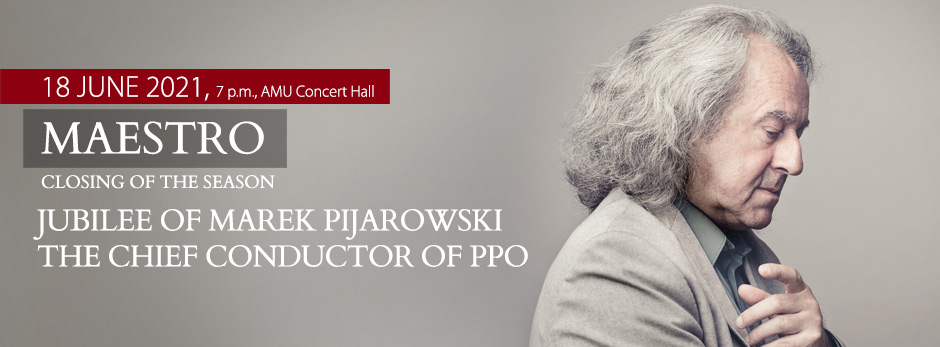
The closing concert of the artistic season 2020/2021 in Poznan Philharmonic (held on Friday, the 18th of June at 7 pm, AMU Concert Hall) will be filled with the music from the Romantic period. Marek Pijarowski, the chief conductor of the Poznan Philharmonic, who celebrates this year both the 50th anniversary of his artistic work and his 70th birthday anniversary, would be the man of the hour.
Cello Concerto in A minor, Op. 33 by Camille Saint-Saëns is one of the most prominent works of that genre, though it is not performed as often in the philharmonic halls as the cello concertos by Antonín Dvořák, Robert Schumann or Joseph Haydn. Saint-Saëns wrote it in 1872 for an outstanding Belgian cellist Auguste Tolbecque who played the piece for the first time in January 1873 in Paris Conservatoire. The next cello concerto by that composer hasn’t been written until 30 years later – in 1902. Though it was a typical virtuoso concerto, it has never met with the success achieved by the first one, which is attributed to the high level of the performance issues.
The most popular symphonic work by Felix Mendelssohn-Bartholdy is his Symphony No. 4 in A major, Op. 90, known as “Italian”. He wrote it at the age of 24 and the music clearly illustrates the echoes of his trip to Italy. It reflects Italian landscapes, culture, the country’s heritage and its inhabitants like a mirror. In the letter to his parents the young composer wrote about the joy that filled his heart, while in the letter to his sister he confided that the Italian symphony would be the most cheerful work he had ever written. This is how the unusually exuberant and energetic musical piece originated.
PERFORMERS:
Tomasz DAROCH – cello
Marek PIJAROWSKI – conductor
Poznan Philharmonic Orchestra
Jakub Kasperski – introduction to the concert
PROGRAM:
- Camille Saint-Saëns, Cello Concerto in A minor, Op. 33
- Felix Mendelssohn-Bartholdy, Symphony No. 4, Op. 90 “Italian”




